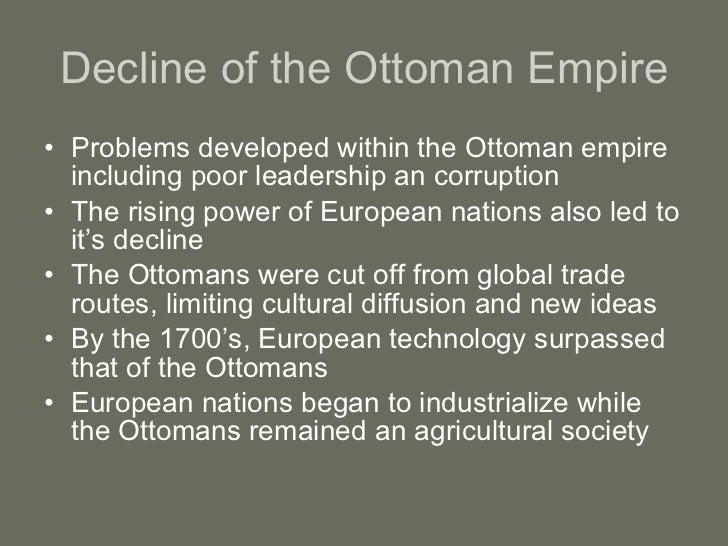Reasons for the decline of the ottoman empire

Social conflicts[ edit ] Europe became dominated by nation states with the rise of nationalism in Europe.
The 19th century saw the rise of nationalism under the Ottoman Empire which resulted in the establishment of an independent Greece inSerbia inand Bulgaria in Unlike the European nations, the Ottoman Empire made little attempt to integrate conquered peoples through cultural assimilation. Ottomanismoriginating from Young Ottomans who were inspired by the French Revolution social contract theorists Montesquieu and Rousseaupromoted equality among the millets and stated that every subject was equal before the law.

Proponents of Ottomanism believed accepting all separate ethnicities and religions as Ottomans could solve social issues. The essence of the millet system was not dismantled, but secular organizations and policies were established.

Primary education and conscription were to be applied to non-Muslims and Muslims alike. Michael Hechter argues that the rise of nationalism in the Ottoman Empire was the result of a backlash against Ottoman attempts to institute more direct and central forms of rule over populations which had previously had greater autonomy. Please help improve this section by adding citations to reliable sources.
Unsourced material may be challenged and removed. October Learn how and when to remove this template message Ottoman Loan certificate, ; printed in French The Capitulations were the main discussion of economic policy during the period. It used to be believed incoming foreign assistance with capitulation could benefit the Empire. Ottoman officials, representing different jurisdictions, sought bribes at every opportunity and withheld the proceeds of a vicious and discriminatory tax system.
Navigation menu
This ruined every struggling industry by the graft, and fought against every show of independence on the part of Empire's many subject peoples. The Ottoman public debt was part of a larger scheme of control by the European powers, through which the commercial interests of the world had sought to gain advantages that may not have been of the Empire's interest. France had 60 percent of the total. Germany had 20 percent. The United Kingdom owned 15 percent. The Ottoman Debt Administration controlled many of the important revenues of the Empire.

The Council had power over financial affairs; its control even extended to determine the tax on livestock in the districts. The revolution created multi-party democracy. Once underground, the Young Turk movement declared its parties. At the onset, there was a desire to remain unified, and the competing groups wished to maintain a common country.]
Reasons for the decline of the ottoman empire - with
New equipment allowed different crops to be grown for the first time. There was a greater turnover in industry jobs because of increased worker empowerment. The end of centralized Ottoman control in the Balkans led to growing instability in the region. It gave European powers an opportunity to protect the empire from internal instability Explanation: D Double d boi. Hopes these helped lol.Absolutely agree: Reasons for the decline of the ottoman empire
| PARENT STUDENT LETTER RE EXAMS JAN | Role Of Fate In King Creon |
| Reasons for the decline of the ottoman empire | 317 |
| Reasons for the decline of the ottoman empire | Impact of telecommunication social or economical |
| China zoledronic acid market | The importance of the water budget |
![[BKEYWORD-0-3] Reasons for the decline of the ottoman empire](https://image.slidesharecdn.com/the-ottoman-empire-1206543913105596-4/95/the-ottoman-empire-14-728.jpg?cb=1206518714) reasons for the decline of the ottoman empire
reasons for the decline of the ottoman empire


Category
Best Posts
- linda lovelace measurements
- Ethics And Infinity By Emmanuel Levinas
- top paper writing services
- race as a social construction definition
- cathedral by raymond carver essay
- My Vacation To Remember Essay
- which of the following is a part of the fibrous tunic of the eye?
- modelling of underwater acoustic communication network
- sociological imagination journal
- The Importance Of Marketing In Business
- buy paper online
- Theme Of Sonnet 75 By Edmund Spenser
- Military Discipline
- Simulation Strategies For Reducing Recidivism Risk






 949
949